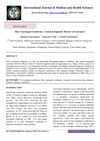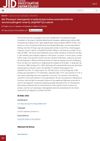
The research found that people's hair proteins vary, especially by ethnicity and body part, which could help identify individuals in forensic science.
[object Object] 
The research found that people's hair proteins vary by individual and body part, with some differences between ethnic groups, which could help in forensics.

Chemicals and stem cells combined have advanced regenerative medicine with few safety concerns, focusing on improving techniques and treatment effectiveness.

Keratin hydrogels from human hair show promise for tissue engineering and regenerative medicine.
 November 2013 in “International Journal of Medical and Health Sciences”
November 2013 in “International Journal of Medical and Health Sciences” Doctors often miss Hair Tourniquet Syndrome, which can lead to serious damage if not treated quickly.

Patients with lichen planus should be tested for hepatitis C.
 March 2012 in “Journal of the American Academy of Dermatology”
March 2012 in “Journal of the American Academy of Dermatology” Treating ovarian-related inflammation may help hair regrowth in women with alopecia areata.
 March 2012 in “Journal of the American Academy of Dermatology”
March 2012 in “Journal of the American Academy of Dermatology” African Americans lack knowledge about laser hair removal safety, Nd:Yag laser treatment is effective with high satisfaction, pressure during surgery can cause hair loss, and treating ovarian inflammation may help with alopecia areata.

Acidic sandy clay damages archaeological hair the most, while dry conditions preserve but make it brittle; silicone oil can help keep the hair flexible.
 June 2003 in “Obstetrical & Gynecological Survey”
June 2003 in “Obstetrical & Gynecological Survey” After chemotherapy for a gestational trophoblastic tumor, normal pregnancy rates are possible, but there's a slightly higher risk of the tumor reoccurring in future pregnancies.
 June 2003 in “Obstetrical & Gynecological Survey”
June 2003 in “Obstetrical & Gynecological Survey” Postmenopausal ovary stromal cells have a unique makeup and limited steroid production, suggesting androgens come from the adrenal gland.
 April 2003 in “Experimental Dermatology”
April 2003 in “Experimental Dermatology” The workshop highlighted the genetic links and psychological impacts of hair loss and skin disorders.
 April 2012 in “Informa Healthcare eBooks”
April 2012 in “Informa Healthcare eBooks” AGA is a common hair loss affecting both genders, treated with various therapies to promote regrowth and slow thinning.
37 citations,
October 2015 in “PeerJ” Perming significantly changes hair's molecular structure, while shampoo and conditioner do not.
86 citations,
April 2009 in “Journal of anatomy” Hard skin features like scales, feathers, and hair evolved through specific protein changes in different animal groups.
7 citations,
January 2020 in “Dermatology online journal” An adult with a rare skin condition improved with tazarotene treatment.
 April 2023 in “Journal of Investigative Dermatology”
April 2023 in “Journal of Investigative Dermatology” The specific skin disease variant p.(Arg2000Trp) in plectin can cause a wide range of symptoms, which should be considered when diagnosing patients.
238 citations,
October 1994 in “Current opinion in genetics & development” The document concludes that recent research has improved understanding of skin diseases and the balance between cell growth and differentiation in the epidermis.
73 citations,
November 2001 in “Journal of Investigative Dermatology Symposium Proceedings” Markers help differentiate between apocrine and eccrine sweat glands to identify sweat gland tumors.
[object Object] 17 citations,
May 2018 in “BMC genomics” Researchers found genes and microRNAs that control curly fleece in Chinese Tan sheep.
14 citations,
May 2017 in “Journal of Investigative Dermatology” A rare gene mutation causes skin fragility and itching without affecting hair or nails.
12 citations,
September 2013 in “BMC Biophysics” Keratin filaments' elasticity is influenced by their terminal domains and surrounding medium.
 10 citations,
September 2022 in “Advanced Healthcare Materials”
10 citations,
September 2022 in “Advanced Healthcare Materials” Current methods can't fully recreate skin and its features, and more research is needed for clinical use.
9 citations,
September 2019 in “PLoS ONE” K42 and K124 keratins are only found in horse hoof lamellae.
8 citations,
October 2020 in “Clinical Psychopharmacology and Neuroscience” rTMS may help treat trichotillomania in some patients.
8 citations,
January 2020 in “PeerJ” Alopecia Areata causes significant structural and compositional changes in hair.
6 citations,
June 1976 in “Journal of ultrastructure research” Keratinized wool cells still have some organelles like lysosomes and mitochondria.
5 citations,
April 2022 in “The journal of investigative dermatology/Journal of investigative dermatology” A new therapy for a skin blistering condition has not been developed yet.
 3 citations,
January 2020 in “Clinical dermatology review”
3 citations,
January 2020 in “Clinical dermatology review” Trichoscopy is useful for diagnosing hair and scalp disorders in people with darker skin.
November 2024 in “Biophysical Chemistry” Hair structure changes immediately during perm treatment, with initial damage partially restored later.















